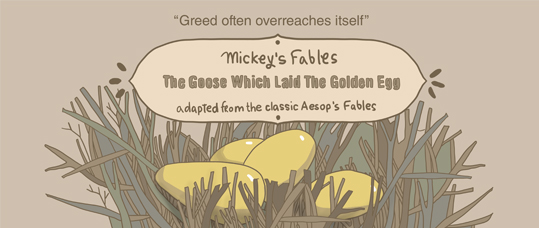THE GOOSE WHICH LAID THE GOLDEN EGG
Once upon a time, on a humble farm near a small town in a sunny valley, lived a farmer and his wife. They had been married for a long time, and loved each other, but life was very hard for them both. They lived in a single-room shack, which had holes in the roof. They hadn't the money for good lumber, or the time to fashion wood shingles, so they tried to repair the roof with straw and sticks bound with mud, but this was never enough: every rain brought drops of water which fell onto their only wooden table, their single chair, and dripped into the bed of straw. They labored from sunrise to sunset, sometimes even longer, hauling water from the river (which was a long way away) for themselves and their livestock: the cows, the chickens, the two pigs, and especially their Goose, who they admired for its beautiful down, and lovely call. Their land and garden was small, and they rarely had enough to sell at market or to exchange for bread or tea, but they eked out a meager living with the few things that had, and they were, all things considered, happy.
Then one day, after gathering all the eggs from the chickens, the farmer's wife looked under the goose. To her amazement, there, in the straw where the goose nested, she found an egg. The goose had never laid an egg before, and the farmer's wife was sure he would be as surprised as she had been, so she picked it up to take to him, but found it unusually heavy. It seemed heavy as lead. On closer inspection, it was also an unusual color: it was neither white nor brown, but yellow in color, and glittering. It was, she decided, a special egg, and she hoped it would also have a special taste. She was determined that it would be a special part of their evening meal.
Soon she was in the kitchen, and having put away a few eggs to trade tomorrow, began preparing their simple meal. She poured the milk into their two wooden cups, sliced the black bread their neighbor had exchanged for five eggs, brought out some dried salted fish from the market and put water on to boil in a kettle. When the water was bubbling and steaming, she picked five eggs out of her basket: two for her, two for her husband, and the beautiful yellow egg she would present to him. She carefully set all five in the water.
A few minutes later, her husband returned from his labor, exhausted. The table had been set: the two wooden cups of milk, two plates, each with fish, bread, and a small lump of butter. “What's this?” her husband exclaimed, “both fish and butter for one meal! Is it a holiday I have forgotten? Easter? Such luxury!”
“Oh, it is a special day,” his wife replied, “and we have so few of those, that I thought we must celebrate, for today we have had an egg from the goose!” And with that she drew the eggs from the water, two for each plate, and in the center of the table she set the glittering egg the goose had laid.
The farmer smiled, pleased. His wife watched with delight as he picked up the egg, feeling for the first time its weight. The look on his face amused her. “I'm hoping it tastes as good as it looks,” she confessed, “I don't know myself. It is unusual, but I thought you should have the first taste.”
The farmer held the egg up and tapped it gently with a spoon. “So strangely heavy,” he remarked, “but I hope you are right about it being delicious. We will find out soon!” And with that, he cracked the shell, and began peeling the egg. When that was done, he took the knife from the table – they had only one – and tried to divide it in half, but the blade caught on something solid. "What the devil!" he exclaimed.
He and his wife peeled off the white, and found, instead of the yolk they expected, a round lump of pure gold. They were shocked and astonished, and as a result they didn't even finish their meal, not even the bread and butter, or the expensive fish. “We're rich!” the farmer mumbled with disbelief, repeating “rich, rich, rich!”
The next day, the farmer neglected all of his duties, and walked into the city. Once there, he sold the nugget to a jeweler, and spent every last bit of the proceeds on a new wardrobe, a cart, and even a horse. He returned to his wife, who was very angry with his spending spree. “But there are so many more useful things we could have had!” she protested, “some real porcelain plates and utensils, for instance. A real bed, a new stove, or even some shingles for the roof, for Pete's sake!”
And the farmer was ashamed. He put away his new clothes, knowing that his wife has been wearing the same dress for years. “I'll make it up to her,” he thought to himself, “I don't know how, but I will!”
He worried throughout the night. But first thing in the morning, he went to the chicken coop. He checked under the goose, and it seemed his prayers had been answered. “Another egg!” he cried to himself, and cracking it open that instant, found that the yolk, indeed, was another nugget of gold. Without hesitation, he rode into town, and purchased a down mattress, a bottle of cognac, an iron stove, and even some shingles for the roof. He held back just enough cash for a new dress, which he would let his wife select for herself.
Meanwhile, his wife had neglected the garden. Although she spent the whole day wandering among the rows of carrots and tomatoes, she was preoccupied with thoughts of the wasted money, and what could have been bought. However, when her husband appeared with the cart, she forgot about everything, and rushed to join him.
Over a glass of cognac – he had bought glasses, too – the farmer told his wife the whole story. Soon, while the chickens went hungry a second day, and in the garden weeds grew, they got tipsy, and then drunk. Late into the night, talking about this bounty, they began to get greedy. While another egg tomorrow would probably fetch them enough money for all new furniture, and even enough for another cow, it would not be enough for new land, or a new house, much less the servants of which they dreamed. In their greed, they decided to cut open the goose, and get all the gold at once instead of waiting, and when they did, they found – nothing. And now the goose was dead, as well as the chickens whom had been two days unfed, as well as the pigs, and the garden was full of weeds.
And the moral is:
GREED OFTEN OVERREACHES ITSELF.
















